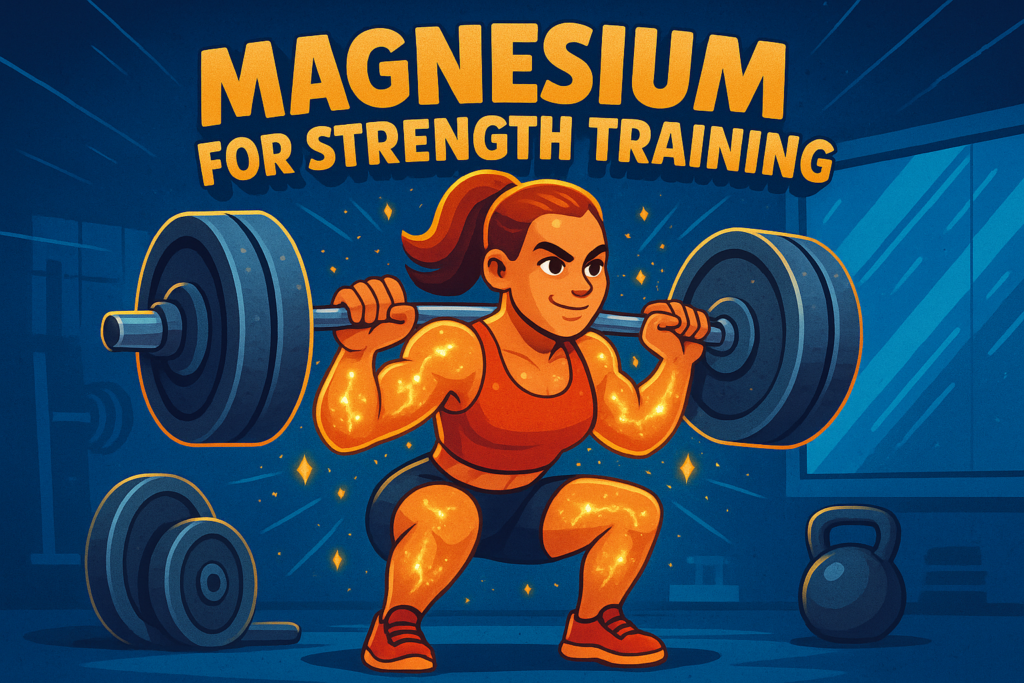Magnesium is one of the most important minerals in the body, yet it often goes overlooked when it comes to muscle health. This essential nutrient is involved in over 300 biochemical reactions, including energy production, muscle function, and nerve transmission. For athletes, fitness enthusiasts, or anyone engaged in physical activities, magnesium supplementation plays a vital role in enhancing muscle strength, preventing cramps, and speeding up recovery after exercise.
Magnesium supplementation for muscle health isn’t just for those struggling with muscle cramps or soreness; it’s also a powerful tool for optimizing athletic performance. In this post, we’ll explore the scientific connection between magnesium and muscle health and break down how magnesium supplementation can help boost your strength and improve recovery after exercise.
How Magnesium Supports Muscle Health
Magnesium plays a pivotal role in muscle health by helping muscles contract and relax efficiently. When you exercise, your muscles contract to perform a movement, and then they need to relax to recover. Magnesium’s role in muscle function is to support this balance.
When magnesium levels are low, your muscles can’t properly relax after contracting. This can lead to persistent muscle tension, cramping, and spasms, especially after intense physical activity. Magnesium helps balance calcium in your muscle cells, which is crucial for muscle contraction and relaxation. Calcium triggers muscle contraction, while magnesium ensures the muscle can relax afterward. Without adequate magnesium, muscles may stay in a contracted state, which can result in cramps and fatigue.
Magnesium and Muscle Cramping
Muscle cramps are one of the most common and uncomfortable side effects of intense physical activity. These cramps are often caused by an imbalance of electrolytes, such as calcium, potassium, and magnesium, that help regulate muscle function. Magnesium is especially important in this regard because it helps maintain the proper balance of these electrolytes, preventing the muscles from becoming overstimulated and reducing the risk of cramps.
Magnesium supplementation for muscle health is known to reduce the frequency and severity of muscle cramps, particularly for those who engage in strenuous exercise. A study published in the Journal of the American College of Nutrition showed that magnesium supplementation significantly reduced muscle cramps in individuals prone to nocturnal leg cramps. This is because magnesium helps regulate nerve signals that control muscle contractions, ensuring that muscles don’t contract too forcefully.

In athletes, magnesium can help prevent exercise-induced cramps by replenishing magnesium lost during sweating. Since magnesium is excreted through sweat during physical activity, athletes are at a higher risk of deficiency. Supplementing with magnesium helps restore levels and prevent the painful cramps that often occur after a workout.
Magnesium and Strength Training: Boosting Performance
When it comes to strength training, magnesium plays a vital role in enhancing muscle performance. Magnesium’s involvement in energy production is one of the primary reasons why it can help improve strength and endurance during high-intensity workouts.
Magnesium is crucial for the production of ATP (adenosine triphosphate), the body’s primary energy source during exercise. ATP fuels muscle contractions, and when magnesium levels are adequate, ATP production is optimized, leading to better strength, endurance, and overall performance. Studies have shown that magnesium supplementation can lead to better muscle strength, improved endurance, and reduced fatigue during high-intensity training.
Additionally, magnesium helps to regulate the influx of calcium into muscle cells during contraction. Without this regulation, calcium levels could rise too high, which would cause muscle fatigue and hinder your ability to perform at your best. Magnesium keeps calcium in check, helping muscles to contract efficiently while avoiding premature fatigue.
Magnesium also supports the synthesis of protein, which is essential for muscle growth. After strength training, your muscles need to rebuild and repair, and magnesium plays a critical role in the process by helping produce the proteins that repair muscle tissue. This is why magnesium supplementation is often recommended not only for improving performance but also for aiding muscle recovery.
Magnesium and Muscle Recovery: Faster Healing After Intense Exercise
After a workout, your muscles undergo microtears, and the body’s natural repair process begins. Magnesium plays a crucial role in this process by reducing inflammation and promoting protein synthesis, which accelerates muscle recovery.

Intense exercise, especially strength training or high-endurance workouts, leads to microtrauma of muscle fibers. Magnesium supplementation helps mitigate this inflammation, speeding up the recovery process. A study in the Journal of Sports Science & Medicine found that magnesium supplementation significantly reduced post-exercise muscle damage and inflammation, helping athletes recover faster.
Beyond reducing inflammation, magnesium also plays an essential role in improving sleep quality, which is necessary for muscle recovery. While you sleep, the body works to repair damaged muscle tissue. Magnesium has been shown to improve sleep quality by regulating the production of melatonin, a hormone that controls the sleep-wake cycle. Better sleep means better recovery for muscles, which is why magnesium is so beneficial in the post-workout phase.
Additionally, magnesium supplementation helps manage stress by reducing cortisol levels, the hormone released during physical stress. Elevated cortisol can inhibit muscle recovery, and magnesium’s ability to regulate cortisol ensures that your body is in an optimal state for muscle repair after intense physical activity.
Magnesium Supplement: The Most Bioavailable Forms and Their Benefits
How Much Magnesium Should You Take for Muscle Health?
Magnesium supplementation for muscle health depends on individual factors such as age, gender, and physical activity level. The recommended dietary allowance (RDA) for magnesium is around 310-420 mg per day for adults, but athletes and individuals engaged in intense exercise may need more.
Magnesium supplements are available in various forms, with the most common being magnesium citrate, magnesium glycinate, and magnesium oxide. Magnesium citrate and magnesium glycinate are more bioavailable, meaning they’re better absorbed by the body and are more effective in supporting muscle function.
When taking magnesium supplements, it’s important to start with a lower dose and gradually increase it to avoid potential digestive issues, such as diarrhea, which can occur with higher doses of magnesium.

Before starting magnesium supplementation, consult with a healthcare provider to determine the appropriate dosage and form for your specific needs, especially if you have any underlying health conditions or are taking other medications.
Magnesium supplementation for muscle health is essential for athletes, fitness enthusiasts, or anyone seeking to enhance muscle function and recovery. By ensuring optimal magnesium levels, you can reduce the risk of muscle cramps, improve strength, and speed up the recovery process after exercise.
Magnesium-Rich Foods for Muscle Health
While magnesium supplements are effective, it’s always best to try and get nutrients from natural food sources first. Here are some magnesium-rich foods that you can incorporate into your diet to support muscle health:
- Leafy Green Vegetables: Spinach, kale, and swiss chard are rich in magnesium and other important nutrients like vitamin K and fiber.
- Nuts and Seeds: Almonds, pumpkin seeds, sunflower seeds, and cashews are great sources of magnesium. They also provide healthy fats and protein.
- Legumes: Beans, lentils, and chickpeas are not only rich in magnesium but also provide a good source of protein and fiber.
- Whole Grains: Brown rice, quinoa, oats, and barley are excellent sources of magnesium and help maintain healthy blood sugar levels.
- Fish: Fatty fish like salmon and mackerel are not only rich in magnesium but also packed with omega-3 fatty acids, which support muscle repair and overall health.

Incorporating these foods into your meals ensures that you maintain healthy magnesium levels naturally, supporting muscle function and overall well-being.
FAQs About Magnesium Supplementation for Muscle Health
1. Can magnesium supplementation help with muscle cramps during exercise?
Yes, magnesium helps regulate the balance of electrolytes and reduces the risk of muscle cramps, especially during and after intense exercise.
2. How does magnesium improve muscle strength?
Magnesium supports ATP production, regulates calcium in muscle cells, and ensures efficient muscle contraction, all of which enhance muscle strength and endurance.
3. Is magnesium effective for muscle recovery after exercise?
Yes, magnesium helps reduce inflammation, speeds up muscle repair, and improves sleep quality, all of which contribute to faster recovery.
4. How much magnesium should I take for muscle health?
The recommended daily intake is 310-420 mg for most adults, but athletes may require more. Consult with a healthcare provider for personalized recommendations.
5. Can magnesium help with sleep after workouts?
Yes, magnesium improves sleep quality, which is essential for muscle recovery. Better sleep means more effective repair and growth of muscle tissue.
Disclaimer
The information provided in this blog post is for general informational purposes only. It is not intended as medical advice, diagnosis, or treatment. Always seek the advice of your physician or a qualified healthcare provider before making any dietary changes or if you have any concerns regarding food ingredients. The effectiveness and safety of food additives can vary depending on individual health conditions and sensitivities.
